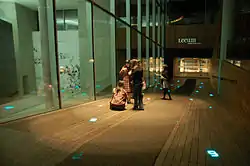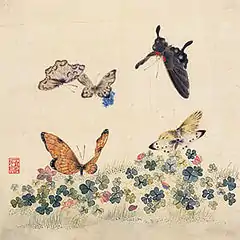Leeum, Samsung Museum of Art
The Leeum, Samsung Museum of Art is a museum in Hannam-dong, Yongsan-gu, Seoul, South Korea, run by the Samsung Foundation of Culture.[1]
| Leeum, Samsung Museum of Art | |
|---|---|
삼성미술관 리움 | |
 | |
 | |
| General information | |
| Type | Art Museum |
| Address | 747-18 Hannam 2-dong, Yongsan-gu, Seoul, South Korea 140-890 |
| Town or city | Seoul |
| Country | South Korea |
| Completed | 2004 |
| Client | Samsung Cultural Foundation |
| Design and construction | |
| Architect(s) | Mario Botta, Jean Nouvel, Rem Koolhaas |
| Architecture firm | Mario Botta Architetto, Ateliers Jean Nouvel, Office for Metropolitan Architecture, Samoo Architects & Engineers |
| Structural engineer | Chunglym Engineers |
| Other designers | Landscape: Petra Blaisse |
| Awards and prizes | 2005 Excellence in Design for Civic Architecture Seoul Metropolitan Government |
| Website | |
| Official Website | |
| References | |
| http://oma.eu/projects/2004/leeum-museum | |

The museum consists of two parts, one of which houses traditional Korean art, the other contemporary art. The first part of the museum was designed by Swiss architect Mario Botta and the second part of the museum by French architect Jean Nouvel and Dutch architect Rem Koolhaas.
Collection
Museum 1 houses a collection of traditional Korean art, of which 36 pieces are designated national treasures.
Included in the collection are landscapes and folk paintings, traditional ceramics, and porcelain, such as Celadon and Buncheong, a bluish-green traditional Korean stoneware; 14th-century daggers, crowns, earrings and ornaments; and Buddhist art, sculptures, paintings, and manuscripts.[2]
Two large geometric volumes, a reverse cone and a simple hexahedral shape, form Museum 1. Mario Botta utilized terra cotta bricks on the building's façade.[3]
The interior of Museum 1 includes a lobby, rotunda, and exhibition spaces. The core of the Leeum Museum is the basement lobby created by the reverse cone penetrating the ground. Museum 2 and the Samsung Child Education & Culture Center are all connected here. Museumgoers begin and end their tours in this area. Above the lobby is the white-walled rotunda. The exhibition spaces in Museum 1 are hexahedral. Visitors begin at the top and walk down, visiting each of the four floors, which house ceramics, swords, jewelry, and other traditional Korean artifacts.[3]
Museum 2, designed by Jean Nouvel, features modern and contemporary art from both Korean and foreign artists.[4] Many famous artists such as Damien Hirst, Warhol, Rothko, Yves Klein , and Donald Judd have permanent exhibition spaces.[5] The basement levels of the museum face the sunken garden and gabion walls. The gabion cages are composed of iron and filled with rocks unearthed during the construction process. The sunken garden includes birch trees and ferns.[6][7][8]
The main exhibition hall makes use of post-tension building techniques[6] to create a completely open space without any supporting posts.
Rem Koolhaas was commissioned with designing the Samsung Child Education & Culture Center as well as the museum's master plan. The main entrance into the lobby of Museum 1 is through Koolhaas's glass structure. Upon entering the museum, visitors follow a wooden ramp and pass under a pavilion demarcating the threshold. Koolhaas used pilotis, which not only light the structure but also provide a view of the surrounding buildings and site. The skin of the three-story outer building is composed of steel and glass. Inside, a mixing chamber was created between the glass wall and the Black box and the placement of lighting, piloti, and ramps.[9] The Black concrete box holds temporary exhibits.[10]
Located over the parking garage, the Sculpture Garden showcases sculptural exhibits. The garden consists of a long rectangular strip of gravel and vegetation and the wooden deck that frames it. Recently two of Louise Bourgeois’s Maman sculptures were featured in the Sculpture Garden.[11][12]
See also
References
- "Leeum, Samsung Museum of Art Travel Guide - Seoul City, South Korea". Lifeinkorea.com. Retrieved 2014-03-28.
- "Architecture | Leeum, Samsung Museum of Art". Leeum.samsungfoundation.org. Retrieved 2014-03-28.
- "MUSEUM 1 | Leeum, Samsung Museum of Art". Leeum.samsungfoundation.org. Retrieved 2014-03-28.
- "Blog Archive » Leeum Museum by Mario Botta, Jaen Nouvel, Rem Koolhaas". e-seoul.org. 2010-03-10. Retrieved 2014-03-28.
- "ArtPremium – The Leeum Museum: "Korean Rhapsody"". ArtPremium. 2018-04-13. Retrieved 2018-05-03.
- "MUSEUM 2 | Leeum, Samsung Museum of Art". Leeum.samsungfoundation.org. Retrieved 2014-03-28.
- "Leeum Samsung Museum introduction" (in Korean). Akive. Retrieved 2014-03-28.
- "dcdomain - r9: Dae Han Min Guk Day 3". Blog.dcdomain.org. Retrieved 2014-03-28.
- "Oma- Leeum-Museum". Oma.eu. 2011-06-29. Retrieved 2014-03-28.
- "Samsung Child Education & Culture Center | Leeum, Samsung Museum of Art". Leeum.samsungfoundation.org. Retrieved 2014-03-28.
- "Dcdomain - r9: Dae Han Min Guk Day 3".
- "메인".